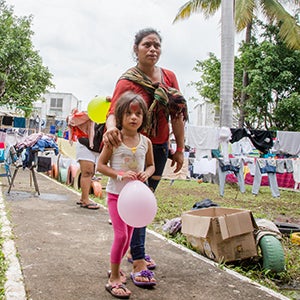
Its only 6 in the morning, but 25 year old Maria is already up after another sleepless night in the Jose Martí shelter in Escuintla. While she wakes up her children; 4 year old twins and a 1 year old baby, she tidies their small space and worries about the future that awaits them now that her home and her crops have been completely destroyed.
Its only 6 in the morning, but 25 year old Maria is already up after another sleepless night in the Jose Martí shelter in Escuintla. While she wakes up her children; 4 year old twins and a 1 year old baby, she tidies their small space and worries about the future that awaits them now that her home and her crops have been completely destroyed. These same worries keep her lying awake at night on the mattress she shares with her husband and children, just a short distance away from the mattresses of families in similar situations. This too keeps Maria awake; "I am so worried my children are going to get sick. There are many children in the shelter with bad coughs and now mine have started coughing too," she said.
There are currently 750 people staying in the shelter. The temperature in Escuintla has risen to almost 30 degrees and humidity hovers between 60 and 80%, increasing the risk of contracting diseases, and obliging those responsible for the shelters to ensure that special attention is paid to keeping everything as hygienic as possible.

PAHO / WHO in action
The Pan American Health Organization and World Health Organization's (PAHO/WHO) office in Guatemala, has carried out evaluation and coordination assessments to assist the victims of the Fuego Volcano in Escuintla. These were led by the Country Representative, Dr. Oscar Barreneche, who visited the affected area during the first 48 hours of the disaster in order to assess the situation and enable PAHO/WHO to immediately concentrate response efforts on preventative measures and treatment for those at the shelters.
The Organization distributed family hygiene kits, water analysis equipment, and sterile items for the management of burns victims in the Roosevelt and San Juan de Dios hospitals in Guatemala City, which are the specialist centers for the treatment of serious burns.
Dr. Barreneche also carried out field visits, technical meetings with Dr. Maria Isabel Pedroza, Escuintla's Health Director, and coordinated with other health network partners in order to better organize and contribute to health response efforts. The health network is led by the Ministry of Public Health and Social Assistance's Risk Management Unit and is co-managed by PAHO/WHO. The network brings together other United Nations agencies in Guatemala, Non-Government Organizations, and humanitarian assistance agencies, which meet to share information and discuss ways to ensure health care in the areas impacted.

"The coordination has enabled us to provide more effective assistance," said Barreneche. "We have brought over disaster expert, Lorenzo Barraza, from Panama, who has helped develop our response plan, and the water testing equipment that we have donated will really help to mitigate our primary concern, which is to ensure that those staying in shelters remain in good health."
"The situation presents us with a real challenge, though, and there is still a lot more to be done," he added. "In order to maintain conditions in the shelters, we have to focus on water, hygiene, vector control, vaccinating children and ensuring coordination between health sectors."
"The people staying in shelters have already lost so much - their homes, their loved ones, their crops. We want to ensure that health care is not an additional worry for them."
The days in the Escuintla refuge pass slowly for Maria and her children. She has still not been able to meet up with her family but she knows they are alive and staying at another shelter. And while she thinks about how to rebuild her life after the tragedy, PAHO/WHO works to ensure that whatever happens, the health of Maria and her children to not add to her worries.




